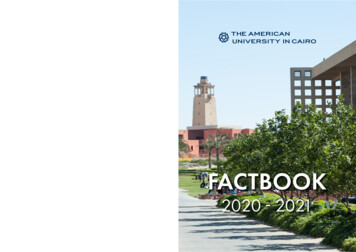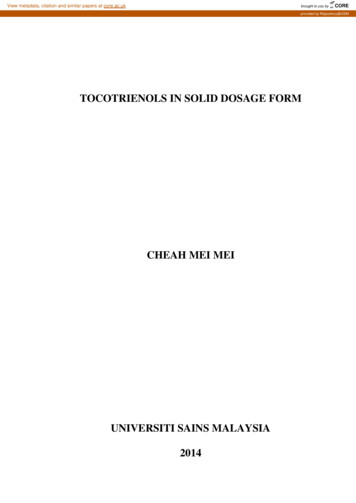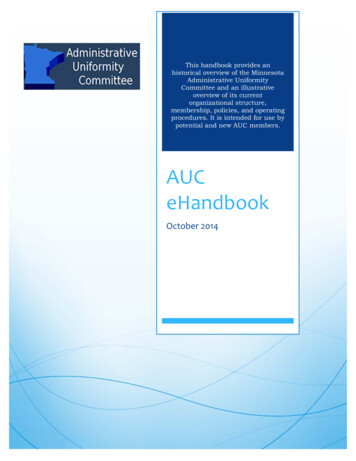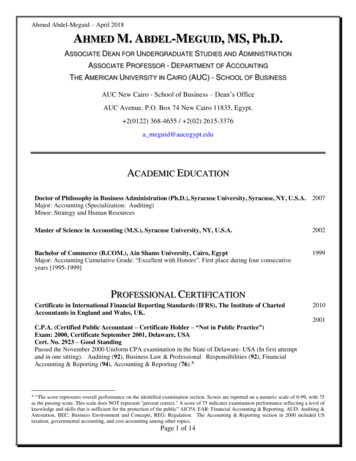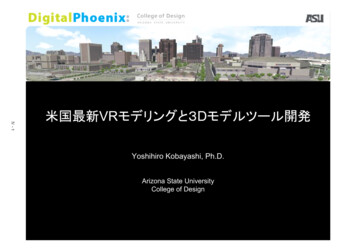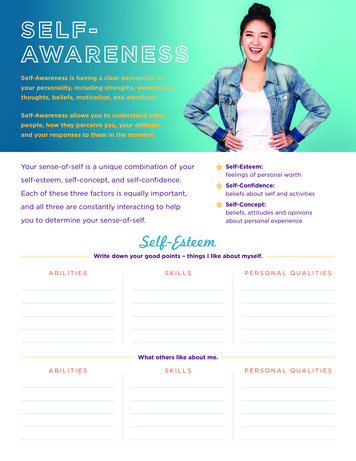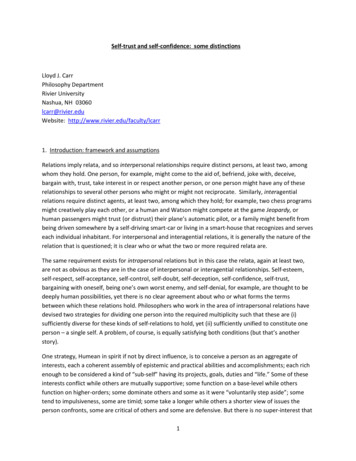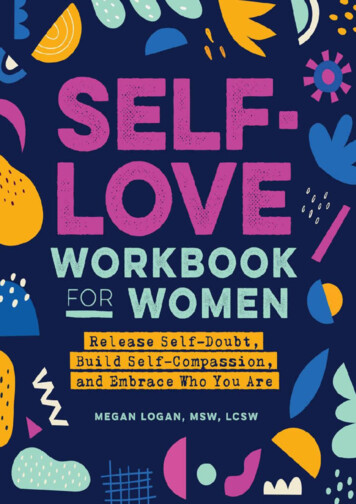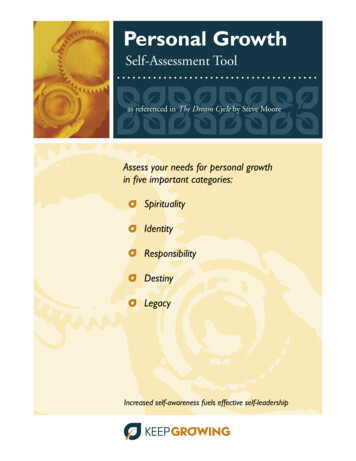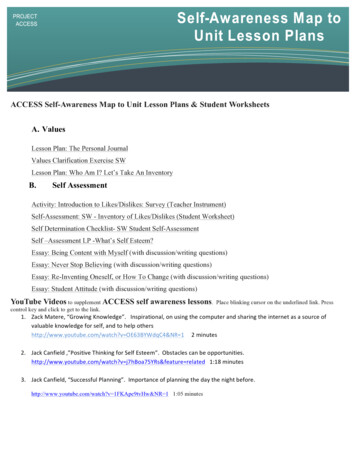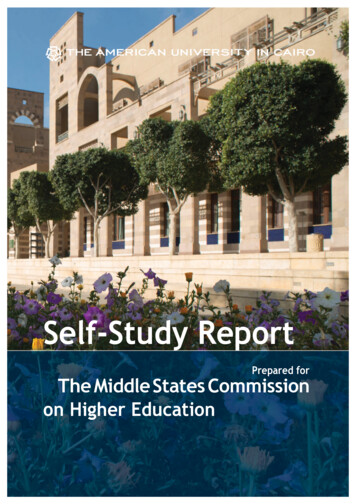
Transcription
Self-Study ReportPrepared forThe Middle States Commissionon Higher Education
March 2018
ELIGIBILITY CERTIFICATION STATEMENTThe American University in Cairo is seeking reaffirmation of Middle States Commission ofHigher Education accreditation.The undersigned hereby certify that the institution meets all established eligibilityrequirements of the Middle States Commission of Higher Education.Name: Francis RicciardoneSignature:Date: January 21, 2018Chief Executive OfficerName: David A. TirrellSignature:Chair, Board of TrusteesDate: January 21, 2018
TABLE OF CONTENTSTABLE OF CONTENTS . 4EXECUTIVE SUMMARY . 5KEY RECOMMENDATIONS FROM SELF-STUDY PROCESS IN 2008 AND PROGRESS MADE . 8INSTITUTION OVERVIEW . 11AUC AT A GLANCE . 13OVERVIEW OF ACCREDITATION . 14NATURE AND SCOPE OF THE SELF-STUDY . 15OUTCOMES OF THE SELF-STUDY . 16STANDARD I: MISSION AND GOALS . 17STANDARD II: ETHICS AND INTEGRITY . 27STANDARD III: DESIGN AND DELIVERY OF THE STUDENT LEARNING EXPERIENCE . 38STANDARD IV: SUPPORT OF THE STUDENT EXPERIENCE . 53STANDARD V: EDUCATIONAL EFFECTIVENESS ASSESSMENT . 68STANDARD VI: PLANNING, RESOURCES AND INSTITUTIONAL IMPROVEMENT . 77STANDARD VII: GOVERNANCE, LEADERSHIP AND ADMINISTRATION . 91
MSCHE Self-study ReportJanuary, 2018EXECUTIVE SUMMARYThe American University in Cairo (AUC) is a premiere English language institution, which ischartered in the State of Delaware and has a North American model of education. AUC offers a broadspectrum of undergraduate and graduate programs in multiple disciplines within a liberal arts context.In addition, AUC has a sizable and reputable continuing education school and community-servicelearning opportunities. Over the years, AUC has earned the accreditation of the Middle StatesCommission on Higher Education (MSCHE), in addition to several international and regionalprogram and unit accreditations. In 2011, AUC became the first institution in Egypt to earn theaccreditation of the Egypt’s then newly formed quality assurance authority, NAQAAE (0.01). Today,AUC is one of the top institutions in Egypt and the region1.In 2018, AUC seeks reaffirmation of its accreditation by MSCHE by demonstrating compliance withaffiliation requirements and standards as stated and assessed by MSCHE. To demonstrate compliancewith all requirements, AUC formed a carefully selected steering committee in 2015 to ensure theinvolvement of the AUC community. The mandate of this committee primarily included undertakingthe preparation of the self-study report and communicating all aspects of the MSCHE accreditationstandards to all university constituents including students, faculty, staff, administration, Board ofTrustees (BoT), and parents.The self-study addresses three primary aspects. First, it demonstrates that AUC has fulfilled allrequirements of affiliation. Second, it examines the strengths and opportunities for improvement soAUC can continue to excel. Third, as there have been many developments within the University andin Egypt since 2008, it allows the University to reflect and share the incredible and exciting story thathas unfolded over the past ten years.After the move to the new campus, AUC reviewed its mission in 2008 based on the recommendationmade by MSCHE. The process of articulating the new mission was conducted collaboratively bydifferent constituents across campus. Today, the new mission is perceived as a reflection of AUCpractices and aspirations. The new mission fosters the concepts of liberal education, meaningfulresearch, community service and high-impact2 practices. Finally, AUC must continue its sincereefforts for internationalization on all fronts as a cornerstone of its mission, despite regional, political,and socio-economic challenges.AUC has been vigilant about ethics and integrity. The institution has been exerting efforts on allrelevant fronts including freedom of speech, equal opportunity, avoiding conflict of interest, instillingdiversity, addressing grievance cases, affordability and others. In the midst of political and economicchallenges nationwide, AUC has taken some administrative and operational actions to fulfillexpectations on ethics and integrity such as developing a Diversity and Advocacy Unit and hiring aTitle IX coordinator. While AUC is constrained by the external political environment in freedom ofexpression and challenging societal norms, the University exercises its right to foster such values. Inaddition, the University will continue its efforts to offer all personnel fair and equal opportunities.AUC offers its students a distinct learning experience through rigorous and coherent programs andbenchmarked degrees. The self-study recommends investigating ways to support English-languageskills of students, which remains a challenge for most English-language institutions operating in anon-native language environment, in addition to reviewing the corresponding means for placement toensure its efficiency in placing students. More effort is being exerted on attracting research funds andscholarships for graduate students, and AUC should consider blended learning as an alternative1In 2017, AUC was ranked #5 in the Arab Region for QS University Rankings ct Practices (HIPs) share several traits: They demand considerable time and effort, facilitate learning outside ofthe classroom, require meaningful interactions with faculty and students, encourage collaboration with diverse others, andprovide frequent and substantive feedback. As a result, participation in these practices can be life-changing”(http://nsse.indiana.edu/html/high impact practices.cfm)Executive Summary5
MSCHE Self-study Draft ReportJanuary, 2018teaching and learning modality for graduate students, including students in executive and continuingeducation.Evidence provided in the self-study demonstrates effective and meaningful support of the studentexperience. This includes the admission process, academic advising, career advising, placement andcounseling. Administrative actions and processes were revisited and adjusted to ensure effectivenessand responsiveness, in addition to institutionalizing Key Performance Indicators (KPIs) supported bya state of the art Business Intelligence (BI) platform and the deployment of data analytics to track andimprove student performance and success. Diversity is also considered central to AUC’s operationsdespite the presence of political and economic challenges. Furthermore, AUC continues to maximizestudent engagement through value-added activities and international exposure and captures theseexperiences in a new co-curricular transcript, which is unique in our entire region. Recentlyimplemented tuition fee policies and financial support are continuously revised to cope with potentialchanges in the value of Egyptian currency. Supported by a major USAID grant and at the invitationof the Egyptian Ministry of Higher Education, AUC is replicating its unique University CareerDevelopment and Counseling Centers across the Egyptian national university system.In 2007, AUC launched assessment plans for all academic and non-academic units. The results areused to enhance their performance and advance the University’s mission. The self-study reveals somelack of consistency in the implementation. Hence, the Provost appointed an Associate Provost forAssessment, Evaluation and Special Projects to ensure effective processes for continuousimprovement of AUC’s academic programs. Likewise, the new President in 2016 launched systemicmanagement quality control processes. These include processes for employee position definition andmatching-to-market for compensation and benefits to ensure quality recruitment and retention, plusprocesses for performance evaluation and recognition. The initial successes of these reviews andassessment processes, plus the impetus of the MSCHE self-study process, have also informed theAdministration’s launch in early 2017 of a community-based process of revising the standing (2015)strategic plan, charged explicitly to enable performance assessment on the basis of specific keyperformance indicators.The University remains committed to the four key objectives of its standing strategic plan (publishedin 2015): 1) to reposition AUC in the world as Egypt’s global university; 2) to unleash learning andmaximize University service to the community; 3) to capitalize on AUC’s new campus and itslocation; 4) to continue to instill integrity, accountability and sustainabilityThe Self-Study has stimulated AUC to take a fresh look at its standing processes to ensure effectiveleadership and sound governance. The results indicate a clearly articulated governance structure withwell-outlined roles and responsibilities. Nevertheless, The University found that it should review,clarify and better communicate roles played by each constituency. The administration has beenworking with faculty, students and parents to establish effective mechanisms and policies forresolving issues of concern. AUC’s community reflects an appropriate shared-governance structure, inwhich all parties contribute and play meaningful roles.The BoT undertook a self-assessment survey on board governance in 2015. In February 2017, theBoT revised the charter and the name of its former Trusteeship Committee specifically to includegovernance. It engaged a top outside consultant throughout 2017 to ensure continuous benchmarkingagainst best practices in American higher education. As one result, the BoT formed a task force underthe Trusteeship and Governance Committee to review the bylaws and all key governance policyissues. In January 2018, the BoT approved the task force’s recommendations. These include a regularreview and reaffirmation of trustees’ responsibilities, and establishment of a process for regularindividual, committee, and full-board self-evaluation against these, with timelines for implementationof results. The task force also recommended that the BoT review and update certain trusteeshippolicies of concern over the years. In 2017, the BoT leadership, President, and Secretary to the BoTbegan re-examination and redefinition of the position description of the latter, deliberately comparingit against similar positions in other American universities, for that officer’s key role in ensuring theBoT’s continuous connectivity to the University.Executive Summary6
MSCHE Self-study Draft ReportJanuary, 2018In conclusion, the Self-Study demonstrates that AUC is compliant with the seven standards, examinesstrengths and opportunities for improvement, and conveys its story. Therefore, as AUC approaches itscentennial in 2019, it is confidently moving forward to serve as a liberal arts beacon of learning inEgypt, the region and the world.Executive Summary7
MSCHE Self-study ReportJanuary, 20188KEY RECOMMENDATIONS SUGGESTED IN SELF-STUDY PROCESS IN 2008 ANDPROGRESS MADEThe previous self-study report completed in 2008 was used as a main source at the beginning of thecurrent self-study process, where recommendations made by both the AUC accreditation team andMSCHE reviewers were examined in addition to the progress made by the university with regards tothese recommendations (0.02).MISSION AND GOALSOne of the main recommendations that arose from the previous self-study was revisiting AUC’smission through a collaborative process, which took place in 2009. AUC revised its mission in ahighly collaborative process led by a task force composed of a cross-section of faculty from diversedisciplines with input from a wide variety of staff. In 2010, the university added a vision statementand articulated a set of core values to help guide planning and decision-making. These werecommunicated to the AUC community through posters with the AUC mission, vision and values instrategic locations on campus.AUC also established in its revised strategic plan institutional priorities of “Education for Citizenshipand Service” and “Outreach Enhancing Engagement and Access.” Additionally, the universityincluded “Effective Citizenship” as one of its learning outcomes, established a community basedlearning (CBL) program and implemented the Academic Community Engagement (ACE) educationalapproach. This approach involves students in meaningful community service directly related to theircourse goals, enabling students to link theory with action through guided reflection.ACADEMIC INTEGRITYSome recommendations were made regarding encouraging the University to involve faculty more inthe academic integrity efforts, and continuing to enhance the concept of academic integrity.The Council for Academic Integrity and the Academic Integrity Committee continue to rely ondedicated members (of all faculty ranks, with some staff) to fulfill their missions. They also relied onfaculty to participate in redesigning the graduate academic integrity tutorial required for all newgraduate students, which was introduced two years ago. The Community Standards Office (CSO) isalso partnering with the Writing Center to create a new workshop on avoiding plagiarism for studentswho have been caught plagiarizing. The Code of Academic Ethics is available, in digital form, and allnew community members are required to sign. However, with the change to digital format,enforcement has been more difficult, and we are currently exploring different means of encouragingregular reminders for students.ASSESSING SATISFACTIONAnother recommendation was made to survey staff satisfaction, which was scheduled for launch in2011, but was delayed due to the Egyptian revolution. In an effort to address this issue, AUC recentlylaunched a culture and institutional effectiveness survey in fall 2017 (0.03) surveying all universityconstituents (students, faculty, staff, senior administration) as part of a vast project to assess theculture and institutional effectiveness of AUC. The results of this survey will be used to establish aclear assessment of the current culture at the University and develop a plan to move forward towards amore ideal culture and vision of institutional effectiveness. This plan will inform and contribute toAUC’s revised strategic plan.EFFICIENT NUMBER OF FACULTYKey Recommendations Suggested in Self-Study Process in 2008 and Progress Made
MSCHE Self-study ReportJanuary, 20189Addressing the need to maintain an efficient number of full-time faculty and adequate number ofadjunct faculty was another concern that arose from the previous self-study. In 2014, Former Provost,Dr. Mahmoud ElGamal started to study the optimum number of faculty per department and formed atask force to develop a faculty workload point system. In 2015, Former Provost, Dr. Sherif Sedkybuilt on Dr. ElGamal efforts and reviewed the optimum number of faculty needed in all departmentsacross the University to ensure that each department had sufficient full-time faculty to meet studentdemand and, at the same time, to ensure that adjunct faculty did not exceed 25% of the total numberof faculty within the department. As a result of this review, in addition to the generated credit hoursby full-time and part-time faculty, one can see that the average generated credit hours for full-timefaculty from fall 2012 to fall 2017 was two third and that of the part-time faculty over the same periodwas one third. In addition, looking at numbers of full-time faculty over the past ten years, AUC had435 full-time faculty in 2008, with a peak of 505 in 2013, followed by a decrease to 436 in 2016.However, efforts made to ensure departments hire any needed faculty since 2015 have begun to showresults in 2017, with an increase in total number of faculty from 436 in 2016 to 452 in 2017 and adecrease in adjunct faculty numbers from 157 in 2016 to 146 in 2017 (0.04).Furthermore, the Monitoring Report in 2010 mentioned that 40 to 50 percent of core curriculumclasses are presently taught by part-time faculty, and that more full-time faculty need to beencouraged to teach in the Core Curriculum. The University has made a number of changes toencourage faculty to teach in the Core Curriculum, and by looking at the number of pre-300 levelsections taught, we can see that 36% of these sections were taught by part-time faculty in 2017.TRACKING SUCCESS OF AUC GRADUATESBetter tracking of the success of AUC graduates was an important recommendation made in 2008.Since 2011, the University’s Career Center has conducted an annual survey of undergraduate andgraduate student alumni in their first-year post-graduation. The survey focuses on gatheringinformation concerning market demand, career placement and graduate study. In addition, severaldepartments launched tailored employer and/or alumni surveys to assess their graduates, examplesinclude surveys sent out by: Department of Mathematics and Actuarial Science in 2017; DepartmentComputer Science and Engineering in 2016 and 2014; School of Business in 2013; Political Sciencein 2011 and Global affairs in 2010 (0.05, 0.06, 0.07, 0.08).Furthermore, in 2015, the alumni office in collaboration with a consultant company launched aqualitative research project to help understand AUC alumni’s views about the quality of education atthe University; provide an assessment of the alumni office in terms of the services provided,engagement and credibility; and formulate recommendations to enhance the strategy of the office toreflect graduates’ needs and expectations. Methodology of the research included focus groups and indepth interviews with alumni. Recommendations based on the assessment of the results included:communicating the office’s offerings more efficiently, increasing the willingness to contribute funds,highlighting the benefits of the alumni card, and providing interesting and more frequent events foralumni (0.09).PROGRESS IN PLANNING AND ASSESSMENT PROCESSESAnother major recommendation made by the reviewers was the continued direction of the campuswide assessment process and its continued integration into the planning function.Since 2008, AUC has undertaken an ongoing development process for its institutional assessment.AUC has clear policies and procedures to document progress in student learning and clear assessmentprocesses at different levels within the institution. All programs follow a six-year assessment cycleand are required to report their results annually, in addition to reporting how they have used theresults to improve their effectiveness. Furthermore, AUC administers many institutional surveys toKey Recommendations Suggested in Self-Study Process in 2008 and Progress Made
MSCHE Self-study ReportJanuary, 201810assess different aspects of the university (5.08), including international surveys and skill tests suchNSSE (5.24), ECAR (5.23) and the CAAP test (3.78), which in addition to assessing institutionaleffectiveness, allows benchmarking.After the 2008 reaccreditation self-study process, efforts to link planning to resource allocation wereimplemented through an in-house developed system: The Planning Matrix; however, these effortswere found to be insufficient. Planning and assessment were governed by two distinct committeeswith separate mandates and members, where assessment was positioned as an academic function andplanning as a resource allocation function. To improve the effectiveness of both the planning andassessment processes, the University integrated the processes of planning, assessment and resourceallocation, and consolidated their governance under the umbrella of one committee: the Planning andAssessment Committee (PAC).In 2016, the Provost requested that all units - academic or non-academic - submit their 2016-2019strategic plans in alignment with the University mission and outlined strategic plan. Departments andunits are required to link their planning process to the budget, followed by assessing the progress oftheir plans annually, which began in November 2017 (5.05). The results of these efforts have beenimpressive, nevertheless, the PAC Committee needs to continue to instill the culture of planning andassessment in all aspect of AUC’s operations to yield workable plans, integrated, assessed and moreimportantly ensure the use of these results for continuous improvement.IMPROVING THE ACADEMIC EXPERIENCEAUC has recently undergone several challenges with regards to the recent events in Egypt, beginningwith the 2011 revolution and recently with the devaluation of the Egyptian pound. This necessitated acourse of action by the University to ensure that it maintains its worthy reputation and continues toattract the best caliber of students possible.In 2012, the late Provost Haroun established taskforces to address a variety of issues around campussuch as Advising, Registration and Mentoring (ARM) and its CARE standing committee, whichaddress the quality of academic services provided. In addition, assessment of learning outcomes of allacademic programs are conducted annually, where all departments are asked to report on theachievement of their learning outcomes. Furthermore, departments are also required to explain howthey will use their assessment results by including an action plan for improvement. Alongside thesetaskforces, efforts to address full-time faculty workload were initiated, based on the recommendationmade from the previous self-study process in 2008 to move from a 3-3 teaching load to a 3-2 teachingload. These efforts led to the creation of a designated taskforce created by former Provost ElGamal todesign and develop a flexible faculty work load point system allowing faculty more time for research(3.33).Accordingly, in an effort to ensure that AUC continues to assess effectively and maintain a highquality of teaching, the Provost created a task force in 2017 with the following charge: 1) appraise thequality of education at AUC; 2) specifically devise mechanisms that would enhance and promotegood teaching practices across departments; 3) develop a comprehensive teaching evaluation programthat would include a multifaceted approach (0.10).The task force began carrying out its charge by collecting data on perceptions of different constituents(students, alumni, parents, the market) regarding the quality of education at AUC, and created furtheraction items such as developing a comprehensive teaching evaluation program and improvingteaching and learning assessment tools. The taskforce has concluded its findings, which was sharedwith the Provost Council, Cabinet and BoT and translated into a set of action items and measurementsto monitor progress. Recommendations to keep this as a standing taskforce is also in progress toensure that this continues to receive the focus it deserves.Key Recommendations Suggested in Self-Study Process in 2008 and Progress Made
MSCHE Self-study Draft Report 11January, 2018INSTITUTION OVERVIEWThe American University in Cairo is an independent, not-for-profit, equal-opportunity institutionoffering English language, American-style liberal arts and professional undergraduate and graduateeducation to students from Egypt, the region and the world. In Egypt, AUC operates within theframework of a 1975 protocol with the government of Egypt; this protocol is based on a 1962 culturalrelations agreement between the Egyptian and the U.S. governments. In the United States, AUC islicensed to grant degrees and is incorporated within the State of Delaware.MISSIONAUC is a premier English-language institution of higher learning. The University is committed toteaching and research of the highest caliber, and offers exceptional liberal arts and professionaleducation in a cross-cultural environment. AUC builds a culture of leadership, lifelong learning,continuing education and service among its graduates, and is dedicated to making significantcontributions to Egypt and the international community in diverse fields. AUC upholds theprinciples of academic freedom and is dedicated to excellence.VISIONOur vision is to be a world‐class University internationally recognized forits leadership and excellence in teaching, research, creative expression andservice. We build on our existing strengths to become the leadinguniversity in the Middle East and the destination of choice for students andfaculty members from around the world seeking in‐depth culturalexposure, combined with outstanding academic programs, cutting‐edgeresearch, as well as an ethically engaged, diverse community of scholars.VALUESExcellenceDiversitySocial ResponsibilityIntegrityLifelong LearningAUC was founded in 1919 as a preparatory school and university by a group of Americans devoted toeducation and service in the Middle East. Its founding president, Dr. Charles Watson, wanted tocreate an English-language university based on high standards of conduct and scholarship and tocontribute to the intellectual growth, discipline and character of the future leaders of Egypt and theregion. At first AUC was only for men, but AUC enrolled its first female student in 1928, the yearthat marked the first graduating class. In 1950, AUC added its first graduate programs. In 1951, itphased out the preparatory school program. By the mid-1970s, the university offered a broad range ofliberal arts and science programs. Afterwards, AUC added Bachelors, Masters, and diploma programsin engineering, management, computer science, journalism and mass communications, and naturaland applied sciences. It also established several research centers, including business, social sciences,philanthropy and civic engagement, and science and technology. Currently, AUC offers 36Bachelor’s degrees, 44 Master’s degrees, two doctoral degrees in applied sciences and engineering,and graduate diplomas in two schools: Global Affairs and Public Policy and Humanities and SocialSciences. AUC's School of Continuing Education offers non-credit courses and contracted trainingprograms. Other professional education programs are offered by the Engineering and ScienceServices Unit, the Global Affairs and Public Policy Executive Education Program, the GoldmanSachs 10,000 Women Entrepreneurship and Leadership Program, the Professional DevelopmentProgram in the Kamal Adham Center for Television and Digital Journalism, and the School ofBusiness Executive Education Program.Academic program enrollments have grown to over 5,474 undergraduates and 979 graduate students(fall 2017). Adult education expanded and now serves more than 24,000 students each year in noncredit courses and contracted training programs through the School of Continuing Education. Ninetyfive percent of students are Egyptian; the remaining 5% comprised of 49 nationalities from around theworld.Institutional Overview
MSCHE Self-study Draft Report 12January, 2018Long considered a leader in higher education in the region, the University has sought national,regional and international accreditation as a means of fostering excellence in governance andacademics. In addition to its accreditation by the MSCHE, AUC was the first university in Egypt toreceive accreditation from Egypt’s National Authority for Quality Assurance and Accreditation inEducation (NAQAAE) with additional school and department level accreditation the School ofSciences and Engineering and the department of Management.AUC was located on a nine-acre campus in the heart of downtown Cairo, a city of more than 18million people and the largest urban area in the Middle East and North Africa. In 1997, the Universitydecided to relocate the campus to the planned community of New Cairo and use the opportunity tobuild an entirely new campus to create a “City of Learning”, designed to embody the University’sliberal arts tradition and provide room for growth. AUC raised more than 100 million in acomprehensive capital campaign in 2003 to raise construction funds, as well as additional monies forscholarships, professorships and other strategic areas (.01). In 2008, the University moved itsacademic programs to its 260-acre new campus. The downtown campus was refurbished to secure thegrowing continuing and professional education programs, as well as to increase the promotion ofcultural and public service programs. Since its move to the new campus, the University has exploredways to make best use of the beautiful, state of the art facilities for academic and co-curricularprograms, students, faculty, staff and the community.Political, economic and social upheaval in Egypt following the 2011 uprising significantly affectedthe entire AUC community, but also reinforced the importance of AUC’s mission and the role itplays. As members of the AUC community came together after the revolution to help their countryand their community build a new future, A
The American University in Cairo is seeking reaffirmation of Middle States Commission of Higher Education accreditation. The undersigned hereby certify that the institution meets all established eligibility requirements of the Middle States Commission of Higher Education. Name: Francis Ricciardone Signature: Date: January 21, 2018
